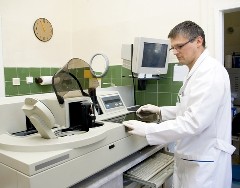|
Is Pharmaceutical Grade Omega 3
|
 Do You Get Quality with Pharmaceutical Grade Omega 3? |
Although there is much scientific research that should now positively reinforce your decision to include more Omega 3 fatty acids in your diet, you have no doubt heard or read somewhere that pollution in the worlds oceans is now a real cause for concern when choosing to eat fish or sea food on a regular basis.
While it is true that the oceans can be a source of heavy metals such as lead and mercury along with dioxins and pcb's, Not all areas in all oceans are as contaminated as others might be. It follows then that there will be some variation in the level of contamination found in the sea life that live there.
As a consumer, you can't be expected to know what is safe to eat and what isn't which is why manufacturers and suppliers should be required to adhere to certain safety standards.
General official recommendations advise that you keep your fresh fish intake to about twice a week to minimize exposure to pollutants. This is unfortunate given the health benefits associated with eating fish.
What about omega 3 fish oil supplements?
Generally speaking, many operators in the health supplement industry are still getting away with inferior product quality. This concerns many people, especially those reputable manufacturers who invest a lot of time and money into a high quality product that the consumer can actually trust.
| Pharmaceutical grade Omega 3 is actually a marketing term that some suppliers use to help sell their product. It is not a term that is used by independent batch testing laboratories to indicate quality. |
It may well be that if a product is marketed as being pharmaceutical grade that it is of very high quality and purity...however a competing product may also claim the same thing, but on closer analysis the two products could vary significantly. The issue lies in the absence of any official and strict guidelines that would form a binding standard for fish oil manufacturers to adhere to. The term pharmaceutical grade is not an official standard and does not indicate the purity of the product from one manufacturer to another in any official capacity.
A set of voluntary standards does exist called a voluntary monograph. The voluntary monograph applies to long chain omega 3 fatty acids, both DHA and EPA from the following origins.
 Real Standards or Pharmaceutical Grade Omega 3? |
The United States Council for responsible nutrition (CRN) - a reputable trade association that represents dietary supplement manufacturers and ingredient suppliers was responsible for the development of the voluntary monograph using World Health Organization guidelines.
Another independent set of guidelines that may exceed but certainly equals the CRN guidelines is now offered by the IFOS - International fish oil standards. The IFOS uses the CRN standards as their point of reference for their recommended product safety guidelines. The IFOS is a private company not a government approved or sponsored agency.
It has become an unofficial standard in the industry that the IFOS guidelines are now synonymous with the term pharmaceutical grade fish oil. However, The IFOS testing facility does not use pharmaceutical grade fish oil as a term to differentiate their standard but rather they use a 'star' rating system.
It is important to note here that only manufacturers that have paid to be assessed by the IFOS testing laboratory will be able to carry the IFOS star rating on their product.
Other manufacturers may well equal or even exceed these guidelines and not carry the IFOS rating simply because they haven't been tested by them. Others of course will come nowhere near the quality recommendations that the IFOS sets.
What should you do to ensure that you are consuming a safe
If it is not clear whether your product of choice has been tested against the IFOS or CRN guidelines then contact you supplier or manufacturer and ask for a copy of their 'specifications and certificate of analysis' for a recent batch of omega 3 product along with a copy of a batch test from an independent third party testing facility. Rate the results against the IFOS or CRN guidelines.
This may seem like a hassle but do you really want to be ingesting disease causing contaminants?
Another alternative is to switch brands to a manufacturer who is happy to make their test data readily accessible to you. Some manufacturers and suppliers are happy to publish their batch data because they are genuinely confident in their product.
The important issue is not whether your product markets itself as being pharmaceutical grade omega 3 fish oil but rather if the manufacturers have been willing to subject their products to independent testing that clearly compare the quality of their omega 3 fatty acids to the CRN or IFOS guidelines...and most importantly, can honestly show that their product equals or exceeds the voluntary monograph standards.
Click here to go from Pharmaceutical Grade Omega 3 to Coronary Heart Health Home Page
Click here to go from Pharmaceutical Grade Omega 3 to What is Omega 3?



